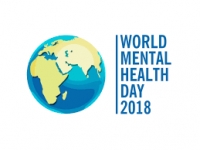
Today is World Mental Health Day One in four people in the world will be affected by mental or neurological disorders at some point in their lives.
According to the World Health organisation, Adolescence and the early years of adulthood are a time of life when many changes occur, for example changing schools, leaving home, and starting university or a new job. For many, these are exciting times. They can also be times of stress and apprehension however. In some cases, if not recognized and managed, these feelings can lead to mental illness. The expanding use of online technologies, while undoubtedly bringing many benefits, can also bring additional pressures, as connectivity to virtual networks at any time of the day and night grows. Many adolescents are also living in areas affected by humanitarian emergencies such as conflicts, natural disasters and epidemics. Young people living in situations such as these are particularly vulnerable to mental distress and illness.
Half of all mental illness begins by the age of 14
Half of all mental illness begins by the age of 14, but most cases go undetected and untreated. In terms of the burden of the disease among adolescents, depression is the third leading cause. Suicide is the second leading cause of death among 15-29-year-olds. Harmful use of alcohol and illicit drugs among adolescents is a major issue in many countries and can lead to risky behaviours such as unsafe sex or dangerous driving. Eating disorders are also of concern.
Growing recognition of the importance of building mental resilience
Fortunately, there is a growing recognition of the importance of helping young people build mental resilience, from the earliest ages, in order to cope with the challenges of today’s world. Evidence is growing that promoting and protecting adolescent health brings benefits not just to adolescents’ health, both in the short- and the long-term, but also to economies and society, with healthy young adults able to make greater contributions to the workforce, their families and communities and society as a whole.

Image: Depression can start at a young age.
Prevention begins with better understanding
Much can be done to help build mental resilience from an early age to help prevent mental distress and illness among adolescents and young adults, and to manage and recover from mental illness. Prevention begins with being aware of and understanding the early warning signs and symptoms of mental illness. Parents and teachers can help build life skills of children and adolescents to help them cope with everyday challenges at home and at school. Psychosocial support can be provided in schools and other community settings and of course training for health workers to enable them to detect and manage mental health disorders can be put in place, improved or expanded.
ABC Comment, have your say below:

2 comments
-
Comment Link
 Wednesday 30 December, 2020
posted by
alpha
Wednesday 30 December, 2020
posted by
alpha
Leave a comment
Make sure you enter all the required information, indicated by an asterisk (*). HTML code is not allowed.
Join
FREE
Here










